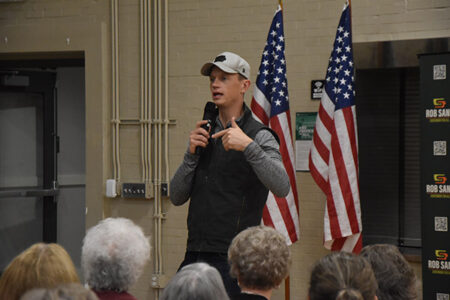USDA Farm Service Agency officials visit Marshalltown
Talk government farming programs, state of agriculture in Iowa

T-R PHOTO BY NICK BAUR Representatives from the Iowa USDA Farm Service Agency (FSA) made a stop in Marshalltown Tuesday morning to deliver training to local farmers to serve on the agency’s county office committees.
Representatives from the Iowa USDA Farm Service Agency (FSA) made a stop in Marshalltown Tuesday morning to deliver training to local farmers to serve on the agency’s county office committees.
FSA county committees are a critical component of the day-to-day operations of the FSA and are composed of local farmers and landowners. The county committees provide grassroots input and location administration of federal farm programs in their respective areas.
The Farm Service Agency as a whole serves all farmers, ranchers and agricultural partners through the delivery of government programs ranging from land and water conservation effort to access to credit for beginning farmers, financial assistance in times of natural disaster, or even providing loans for capital investments.
While the FSA representatives were in Marshalltown to present the training to local farmers in the area, a handful of FSA officials sat down with the Times-Republican Tuesday to talk about the state of agriculture and what their offices are doing to help support farmers in Iowa.
As Executive Director of the Iowa FSA Matt Russell said, the Biden-Harris administration, and the larger USDA, have been taking steps in recent years to provide greater accessibility into the industry for those seeking to become first time farmers.
“I think there’s been a real interest in expanding opportunities for people to come into agriculture, whether that’s even in an urban setting,” Russell said. “That’s something I’m excited about over the next couple of years, is that we are really committed, and I’d say this for our whole agency, just a commitment to welcoming those folks coming into the door of our county offices and helping them either to expand or get into farming. The awareness of our office about all the different things happening in agriculture, I think, is really always improving.”
Yet, with commodities prices skyrocketing since the COVID-19 pandemic and inflationary pressures being experienced across the board, the agricultural industry has not been entirely welcoming to first time farmers recently.
“With commodity prices as high as they are, it’s really hard for them to compete on a rental rate right now,” said Ryan Marquardt, Iowa FSA State Committee member and Madison County farmer. “It’s a lot of relationship building and trying to find a way to just create some kind of nook and cranny here and there. People are working with smaller equipment so you can get to places that other guys don’t want to mess with. You just try to be flexible to be in the marketplace, but it’s definitely a challenging environment for a lot of beginning farmers.”
As Tama County livestock producer and FSA County Office Committee Member Kurt Boerm reported, the prices have seen farmers garner much larger income, but they are also seeing significant increases in costs.
“Most producers are just handling more money,” Boerm said. “Commodity prices are high, but it doesn’t necessarily mean that producers are making that much more money. Controlling expenses is still vital… It’s a strange time, though, but we’ve seen peaks and valleys like this before, a dozen years ago, we had spiking commodities. Price still boils down to supply and demand. The one thing about it is producers are really not in control a lot of the time….. It depends on what’s happening across the world. It depends on elections, it depends on so many different things that are beyond our control, we just have to try to focus on our little part of the world and what things we can control.”
Coupling these price hikes with trade disputes and the active Russo-Ukrainian War in Europe, the past several years have tested farming enterprises across the United States, but Russell says the FSA and USDA are prepared to step in and meet farmers when needed.
“I am impressed with the willingness of Americans to invest in farmers,” Russell said. “We’ve seen that over the last two administrations, several congresses. I can’t predict for sure that’s going to continue, but in my mind, there’s a lot of evidence that partnership between farmers and the American public, the taxpayers, that partnership seems to be pretty strong, and I would anticipate that’s going to continue.”
As Josie Waterbury, Central District Director for the Iowa Farm Service Agency, indicated Tuesday, the FSA county office committees have long been vital in leading efforts to provide aid to local farmers in times of need.
“I will say too, as a committee member advisor, they are a real life example of a grassroots effort,” Waterbury said. “There have been times even in my career that they have pushed issues forward, and although it may take a while, we’ve seen some effective change out of that.”
With many rural communities hinging upon agriculture to sustain them, Waterbury says the effectiveness of the FSA and their programs can help sustain these parts of Iowa.
“I don’t think you can underestimate the impact on rural communities because, yes, farmers have participated in those programs, but that is a direct relation to the health of those rural communities,” she said.
——
Contact Nick Baur at 641-753-6611 or nbaur@timesrepublican.com.





